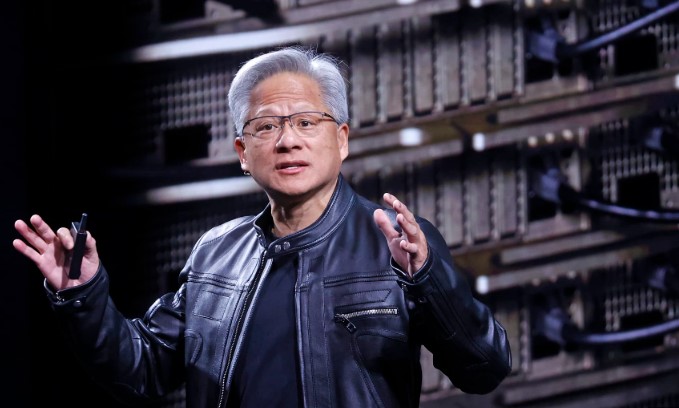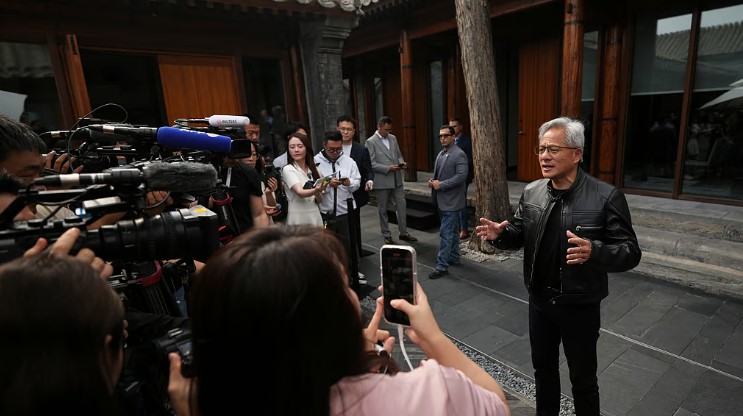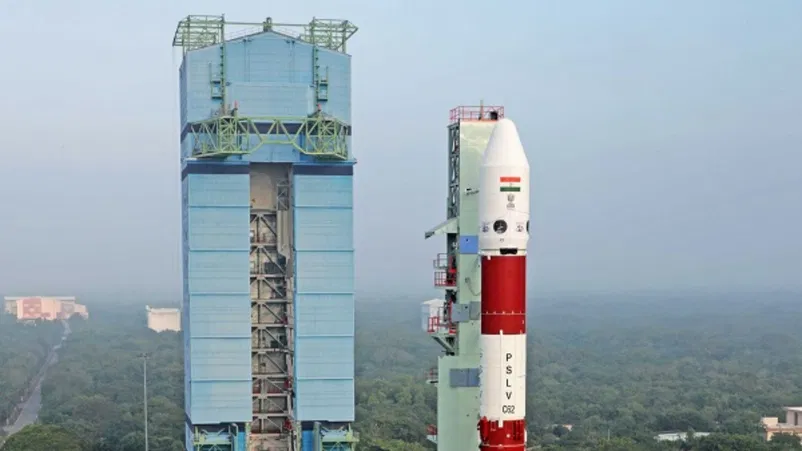
Nvidia China Market: CEO Jensen Huang Reaffirms Commitment Amid Global Shifts
In a strategic move to reinforce ties with one of the world’s largest semiconductor consumers, Nvidia CEO Jensen Huang has reiterated the company’s dedication to the Nvidia China market. Speaking at the China International Supply Chain Expo in Beijing, Huang emphasized the firm’s ongoing efforts to serve Chinese clients, despite mounting global tensions and evolving trade restrictions.
“We are doing our best to serve the China market,” Huang stated, highlighting Nvidia’s willingness to invest and collaborate within China’s vast and fast-evolving tech ecosystem. His comments follow meetings with Chinese officials who conveyed that China remains “open and stable,” and welcomed continued foreign investment in key technology sectors.

A Market Too Large to Ignore
With China representing a substantial portion of global demand for semiconductors—essential components in everything from mobile phones and electric vehicles to AI infrastructure—Nvidia’s presence in the China market remains vital for its global strategy. Huang confirmed that Chinese officials expressed interest in Nvidia’s long-term commitment and its willingness to adapt to policy shifts.
“They want to know that Nvidia continues to invest here,” Huang told reporters. “That we are still doing our best to serve the market here.”
Table of Contents
Toggle
China’s AI Momentum Praised
During the expo’s opening ceremony, Huang praised China’s rapid advancements in artificial intelligence, citing the nation's open-source AI initiatives as a global catalyst. Referring to local startups like DeepSeek, he noted, “China's open-source AI is a catalyst for global progress, giving every country and industry a chance to join the AI revolution.”
He further added, “AI is transforming every industry, from scientific research and healthcare to energy, transportation, and logistics.” Huang also commended China’s “super-fast” innovation driven by its vast community of developers, researchers, and entrepreneurs.

Nvidia’s H20 Chip Strategy for China
Reaffirming its adaptability, Nvidia announced it will resume sales of the H20 AI chips in China, specifically designed to comply with U.S. export restrictions. These chips, while less powerful than Nvidia’s flagship processors, were tailored to meet Chinese demand amid tightened U.S. regulations aimed at curbing military-grade technology exports.
The H20 launch was initially delayed due to licensing hurdles imposed by the Trump administration. However, the U.S. government has now signaled its willingness to issue export licenses, prompting Nvidia to resume deliveries soon. This announcement sent ripples across the global tech sector, with Nasdaq climbing to a new record.

U.S.-China Tech Tensions Still Simmering
Despite Nvidia’s attempt to balance geopolitical tensions with business interests, CEO Huang admitted he had limited influence over U.S. policy shifts. When asked whether he tried to persuade President Trump before visiting China, he responded, “I don’t think I changed his mind.”
“It’s my job to inform the President about what I know very well, which is the technology industry, artificial intelligence,” Huang added, positioning himself as a bridge between innovation and diplomacy.
China's Strategic Response
Vice Premier He Lifeng addressed the ongoing trade tensions during his opening speech at the expo, criticizing countries for “interfering in the market” under the guise of risk mitigation. In a veiled reference to the U.S., he condemned actions like tariff impositions and called for greater global collaboration.
“Global changes of a century are accelerating, with multiple risks intertwining and piling up,” He said. He advocated for an inclusive, de-politicized trade environment that prioritizes long-term development and stability.
China’s foreign ministry echoed similar sentiments, calling the expo a “new calling card” for the country’s commitment to global economic cooperation. Spokesperson Lin Jian emphasized China’s intention to uphold supply chain stability and promote an open global economy.
A Delicate Balancing Act
The Nvidia China market represents a complex intersection of economic opportunity and geopolitical sensitivity. As China grapples with internal economic slowdowns and a property sector crisis, technology remains a cornerstone of its strategy for resilience and growth.
For Nvidia, maintaining a foothold in China isn’t just about revenue—it’s about remaining relevant in the world’s largest and fastest-developing AI ecosystem. The company’s efforts to adapt chip designs, comply with export laws, and engage in open dialogue with Beijing underscore the high stakes of tech diplomacy.
Final Thoughts
Huang’s visit to China and his carefully worded reassurances reflect Nvidia’s deep understanding of the current global climate. As AI continues to reshape industries and redefine global power dynamics, Nvidia’s China strategy could become a model for how tech firms navigate the uncertain waters of regulation, innovation, and international cooperation.
In the ever-shifting semiconductor landscape, Nvidia’s bet on China is clear: adapt, engage, and innovate—while staying compliant and diplomatic. The world will be watching.
Samsung has also been integrating Galaxy AI features across its ecosystem, and the S25 Edge will likely be no exception. Expect improved voice assistants, camera smarts, and AI performance monitoring tools to be key selling points.
GG Face UPW as Playoff Stakes Rise in the WPL Race
Momentum is the most chased yet least owned currency in cricket. It cannot be stored, defended, or borrowed. It is earned moment …
IND vs NZ T20I: Intense Power Clash Sets the Tone Tonight
History is rarely kind to the timid. It rewards those bold enough to challenge the order and those strong enough to defend …
DC vs MI WPL 2026 High Stakes Rivalry Lights Up Vadodara
The Women’s Premier League 2026 returns with a marquee clash as Delhi Capitals and Mumbai Indians face off in Vadodara on Tuesday …
RCB vs GG WPL 2026: A High-Stakes Battle Awaits Tonight
RCB vs GG WPL 2026: A High-Stakes Battle Tonight The Women’s Premier League 2026 is beginning to take shape, and […]
MI W vs UP W WPL 2026 Live Match 8: Mumbai Indians Face UP Warriorz Tonight
MI W vs UP W WPL 2026 Live Match 8: Mumbai Indians Face UP Warriorz Tonight Mumbai Indians Women (MI […]
PSLV Mission Draws Attention After In-Flight Observation
India’s Polar Satellite Launch Vehicle (PSLV) experienced an unexpected development during its latest mission on Monday, as the PSLV rocket deviated from …








